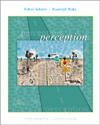| Anton's syndrome | A neurological condition in which a cortically blind person denies his or her blindness.
|
 |
 |
 |
| dualism | The philosophical view that mental events need not be associated with neural events. See materialism.
|
 |
 |
 |
| evoked potential (EP) | The electrical response in a collection of neurons that is provoked by a stimulus.
|
 |
 |
 |
| far senses (distance senses) | Senses, such as vision, that enable an organism to perceive objects or events some distance away. See near senses.
|
 |
 |
 |
| illusions | Perceptual errors.
|
 |
 |
 |
| lesion | Damage to a restricted region of the body, particularly some portion of the nervous system.
|
 |
 |
 |
| materialism | The philosophical view that ascribes all mental experiences to neural events. See dualism.
|
 |
 |
 |
| naive realism | The philosophical view that perception accurately portrays all objects and events in the world.
|
 |
 |
 |
| near senses | Senses, such as touch, that require close proximity between the perceiver and the object or event to be perceived. See far senses.
|
 |
 |
 |
| perception | The acquisition and processing of sensory information in order to see, hear, taste, smell, or feel objects in the world; also guides an organism's actions with respect to those objects. Perception may involve conscious awareness of objects and events; this awareness is termed a percept.
|
 |
 |
 |
| PET (positron-emission tomography) scan | scan An image of the brain, or other structure, that is created by means of positron emission tomography.
|
 |
 |
 |
| psychophysics | The branch of perception that is concerned with establishing quantitative relations between physical stimulation and perceptual events.
|
 |
 |
 |
| sensory transduction | The process occurring within sensory receptors by which physical energy (stimulus) is converted into neural signals.
|
 |
 |
 |
| solipsism | The belief that no one exists other than oneself.
|
 |
 |
 |
| specific nerve energies | The doctrine that the qualitative nature of a sensation depends on which particular nerve fibers are stimulated.
|
 |
 |
 |
| stimulus | The pattern of physical energy set up by an object or event in the environment.
|
 |
 |
 |
| subjective contours | Illusory contours or surfaces, especially like those devised by Kanizsa.
|
 |
 |
 |
| subjective idealism | The view that the physical world is entirely the product of the mind.
|



 2002 McGraw-Hill Higher Education
2002 McGraw-Hill Higher Education

 2002 McGraw-Hill Higher Education
2002 McGraw-Hill Higher Education